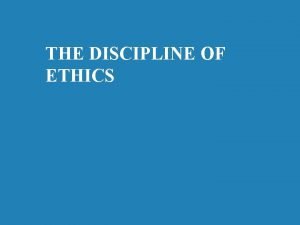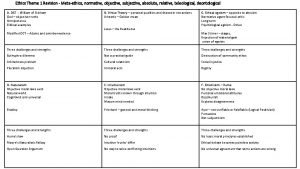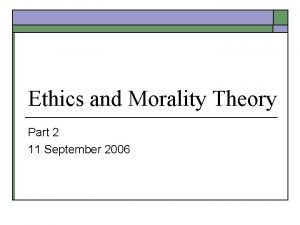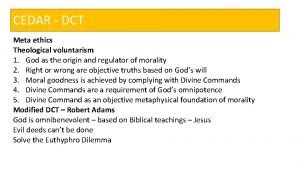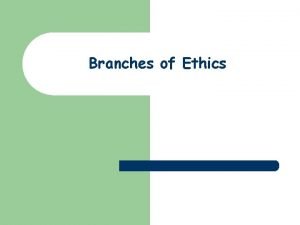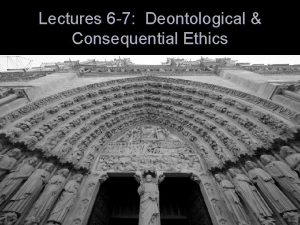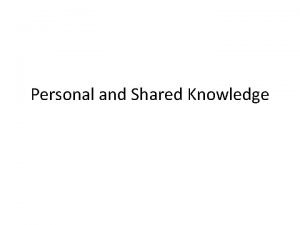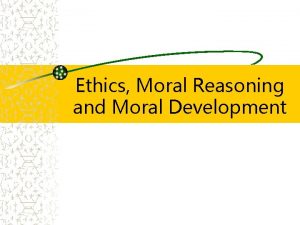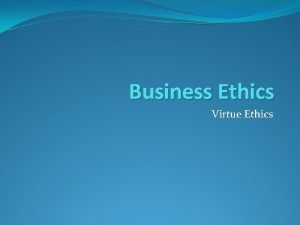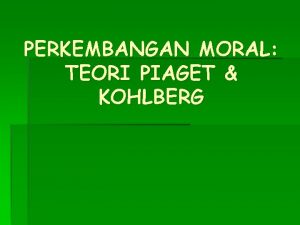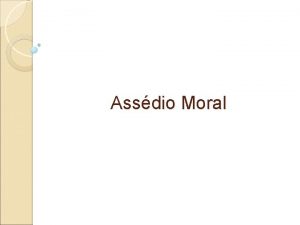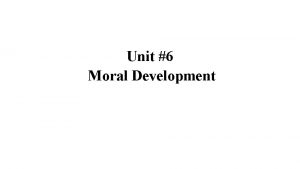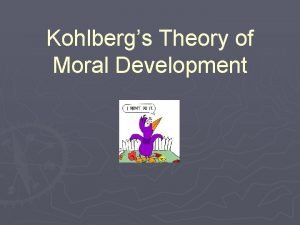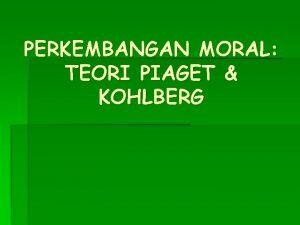Ethics II The nature of moral knowledge Moral













- Slides: 13

+ Ethics II The nature of moral knowledge

+ Moral knowledge n Do you know the difference between right and wrong? n Does anybody? n Is moral knowledge even possible?

+ What is required for knowledge? n There is a lot of controversy over this, but here is the definition we work with in TOK: n Knowledge = n True n Justified n Belief

+ Moral truth? n Most people favour the correspondence theory of truth: a statement/belief is true if and only if it corresponds to the facts. n Do the following statements correspond to the facts? Or, do they merely express emotional reactions? n n n Murder is wrong. Smacking children is wrong. Kissing in public is wrong. Public nudity is wrong. A women should stay in the home and raise children whilst her husband earns the money. It would be wrong to annihilate all life on Earth.

+ Moral truth? Emotivism n Emotivism claims that moral statements do not assert the existence of moral facts: they merely express emotional reactions to situations or actions. n For example, saying “Murder is wrong” is just like saying “Boo to Murder!”, whilst saying “It is good to give to charity” is like saying “Hoorah for charity!” n Exercise: If emotivism is right, is there such a thing as moral knowledge? - Hint, think about the definition of “knowledge”, and the correspondence theory of truth.

+ Moral truth? Nihilism n Nihilists claim that moral statements do assert the existence of moral facts. n However, according to nihilists, there are no moral facts. n Thus, all moral statements are false. n According to nihilists, to claim that an action is moral/immoral is as silly as claiming that an object/person has magical powers. n Exercise: If nihilism is right, is there such a thing as moral knowledge? - Hint: think about the definition of “knowledge”.

+ Moral truth? Realism n Moral realists claim that our moral statements do assert the existence of moral facts, and that there really are moral facts. n Thus, moral realists think that moral statements can be true or false. n So, moral realists do not discount the possibility of moral knowledge on the grounds that moral statements cannot be true. n What else is needed for knowledge? n Justification. n How can we justify our moral statements? n That all depends on the nature of moral facts.

+ Moral justification? Naturalism n Naturalists claim that moral facts are natural facts. n A natural fact is the sort of fact studied by science. n At first, this idea sounds a bit crazy. However, suppose we accept that an action is moral if it has a good effect in terms of the maximization of happiness and the minimization of suffering. n What are happiness and suffering? Aren’t they states of the brain/nervous system? n If naturalism is right, how might we gain moral knowledge? (Think about WOK’s)

+ The is/ought problem n Is the following argument valid? (Remember, an argument is valid if and only if the truth of the premises would make it impossible for the conclusion to be false) n n P 1) War causes a huge amount of suffering and never makes anyone happy. C) War is bad. n Exercise: What would we need to add to the argument to make it valid? n The idea here is that an argument with premises that describe how things are, and a conclusion that describes how things ought to be (i. e. a moral statement) can never be valid. n Exercise: Can you see how this might affect naturalism?

+ Intuitionism n According to intuitionism, there are moral facts, but they are not the kind of facts that can be studied by science. n Moral facts, according to the intuitionist, exist outside of the natural world. n Isn’t the idea of a non-natural fact a kind of superstitution?

+ Intuitionism n Do you believe in numbers? n What is this? n n OK, so what is this? n n 2 2 And this? n 2 n Are any of these THE number 2? n OK, so where does THE number 2 live?

+ Intuitionism n If moral facts are non-natural, how can our beliefs about them ever be justified? n Not through sense perception. Why not? n Intuitionists claim that we have a special “moral intuition”. n Isn’t this as implausible as the idea of “sixth sense”? n Lot’s of philosophers think we have a similar ability to see the truth of mathematical and logical axioms.

+ Discussion questions n Of the following accounts, which do you find most plausible and why? n Emotivism n Nihilism n Naturalism n Intuitionism
 Moral realism
Moral realism Descriptive ethics vs normative ethics
Descriptive ethics vs normative ethics Normative ethical questions
Normative ethical questions Macro and micro ethics
Macro and micro ethics Factual inquiry in ethics
Factual inquiry in ethics Methaethics
Methaethics Descriptive ethics vs normative ethics
Descriptive ethics vs normative ethics Normative vs descriptive ethics
Normative vs descriptive ethics Metaethics vs normative ethics
Metaethics vs normative ethics Meta ethics
Meta ethics Deontological theory
Deontological theory Teleological ethics vs deontological ethics
Teleological ethics vs deontological ethics Descriptive ethics definition
Descriptive ethics definition Personal vs shared knowledge
Personal vs shared knowledge

